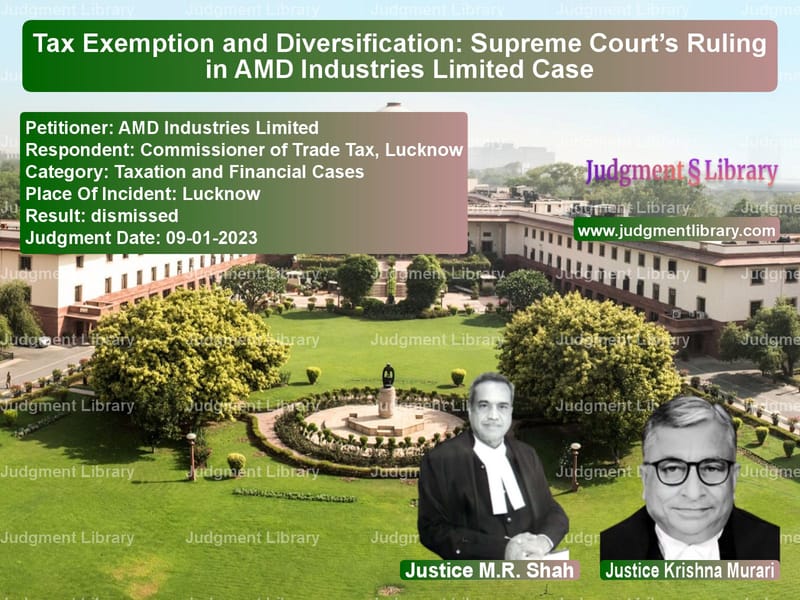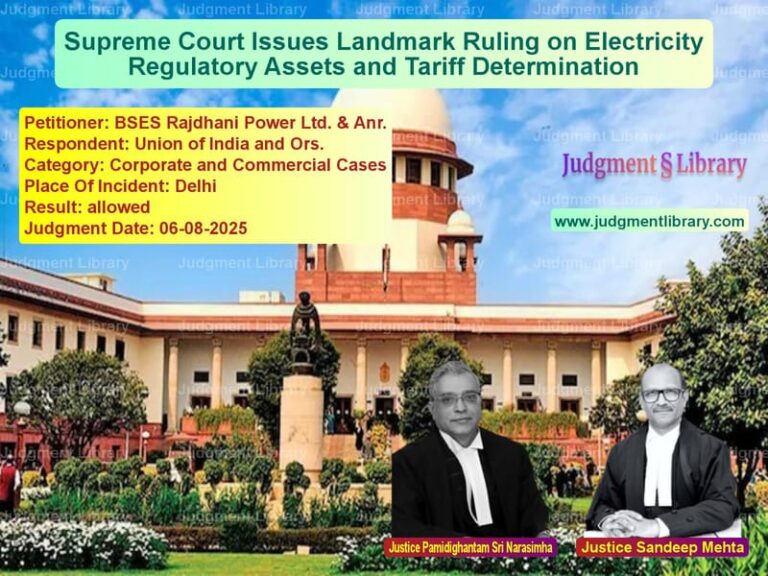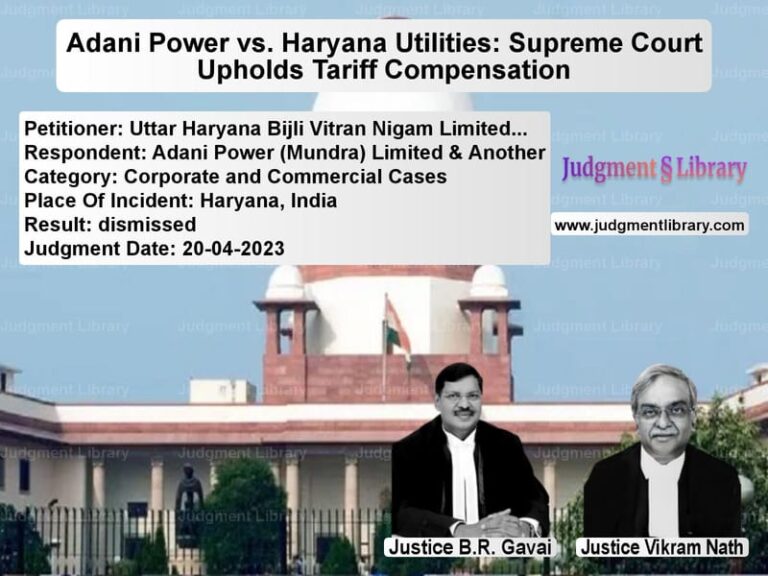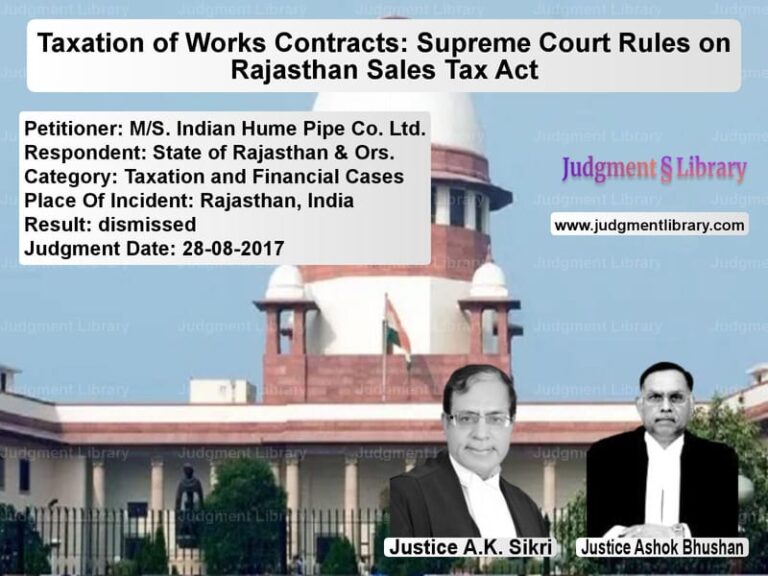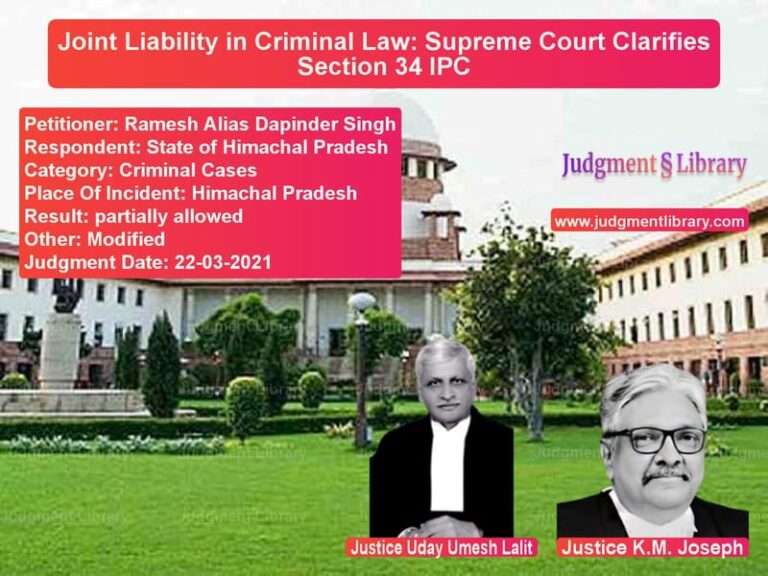Tax Exemption and Diversification: Supreme Court’s Ruling in AMD Industries Limited Case
The Supreme Court of India recently decided a significant case concerning the interpretation of tax exemptions under the U.P. Trade Tax Act. The case involved AMD Industries Limited, formerly known as M/s. Ashoka Metal Décor Pvt. Ltd., and the Commissioner of Trade Tax, Lucknow. The dispute revolved around whether AMD Industries Limited was eligible for an exemption under Section 4-A(5) of the U.P. Trade Tax Act, which provides tax benefits for manufacturers undertaking diversification.
Background of the Case
AMD Industries Limited initially manufactured ‘Spun Line Crown Corks,’ a material used for sealing glass bottles. In the year 2000, the company decided to expand its manufacturing and introduced a new product, ‘Double Lip Dry Blend Crowns,’ which it claimed to be different from its earlier product. Seeking tax exemption, the company applied for an eligibility certificate under the diversification scheme of the Trade Tax Act.
However, the certificate granted to the appellant categorized their project under ‘modernization’ rather than ‘diversification,’ thereby making them ineligible for the claimed exemption. The dispute eventually reached the Trade Tax Tribunal, which upheld the decision of the tax authorities, ruling that the new product was not sufficiently different from the old one to qualify as a diversified product.
Arguments by the Appellant
The appellant, represented by senior counsel, presented the following arguments:
- The company invested Rs. 4.5 crores in new machinery and technology for manufacturing the new product.
- The new product was eco-friendly and used PVC granules as raw material instead of traditional substances.
- The manufacturing process for the new product was different, requiring distinct machinery and production techniques.
- The company claimed that ‘Double Lip Dry Blend Crowns’ were a different product in commercial parlance from ‘Spun Line Crown Corks’ and that they should qualify under ‘diversification.’
- Past Supreme Court rulings have held that exemption provisions should be interpreted literally, and in this case, the appellant met all the criteria for diversification.
Arguments by the Respondent
The respondents, representing the Commissioner of Trade Tax, presented counterarguments:
- The primary function of both products remained the same – sealing glass bottles.
- The investment made by the appellant amounted to modernization, not diversification.
- Under Section 4-A(5) of the Act, diversification requires a unit to produce goods that are entirely different in nature, not just an improved version of an existing product.
- The company had only enhanced the quality and production volume of its product, which was not sufficient to classify it as a diversified good.
- Based on past precedents, exemption provisions must be strictly construed, and the appellant failed to meet the legal test of diversification.
Supreme Court’s Judgment
After carefully considering the arguments presented by both sides, the Supreme Court ruled against AMD Industries Limited, holding that the exemption claim was not justified under Section 4-A(5). The key observations made by the court included:
- “For the goods manufactured using modern technologies to be classified under ‘diversification,’ they must be entirely different from the goods produced earlier.”
- “Diversification must result in a product that is distinct and separate in nature.”
- “A mere improvement in the production process or technology does not qualify as diversification.”
- “If the ultimate use of the product remains the same, it does not satisfy the statutory requirement for diversification.”
The Court further clarified that the mere introduction of new materials and modern manufacturing techniques does not automatically create a new product for tax purposes. The appellant’s new product, ‘Double Lip Dry Blend Crowns,’ still served the same purpose as its earlier ‘Spun Line Crown Corks’ and was not fundamentally different.
Legal Precedents Considered
The Court cited several past rulings to support its decision:
- Hansraj Gordhandas Vs. H.H. Dave: Emphasized that tax exemption provisions must be interpreted strictly.
- Parle Biscuits (P) Ltd. Vs. State of Bihar: Held that exemption under tax laws cannot be granted unless the manufacturer meets all prescribed criteria.
- Commissioner of Sales Tax, Orissa Vs. Jagannath Cotton Company: Stated that classification of a new product must be based on how it is perceived in commercial parlance, rather than its production technique.
Implications of the Judgment
This ruling has significant implications for businesses seeking tax exemptions under the Trade Tax Act:
- Companies must ensure that their new products are entirely distinct in commercial use and nature before claiming diversification-based exemptions.
- Mere changes in technology, production techniques, or raw materials do not qualify as diversification.
- Manufacturers should carefully assess whether their product falls under expansion, modernization, or true diversification before applying for tax relief.
- Authorities will likely apply a stricter interpretation of exemption provisions, requiring clear distinctions in product classification.
Conclusion
The Supreme Court’s decision in this case underscores the need for manufacturers to fully understand the distinction between diversification and modernization. While investments in technology and improved processes can enhance production efficiency, they do not necessarily create a new product in the eyes of the law. This ruling serves as a precedent for future cases involving tax exemption claims, reinforcing the principle that exemptions should be granted only when all statutory requirements are met.
Petitioner Name: AMD Industries Limited.Respondent Name: Commissioner of Trade Tax, Lucknow.Judgment By: Justice M.R. Shah, Justice Krishna Murari.Place Of Incident: Lucknow.Judgment Date: 09-01-2023.
Don’t miss out on the full details! Download the complete judgment in PDF format below and gain valuable insights instantly!
Download Judgment: amd-industries-limit-vs-commissioner-of-trad-supreme-court-of-india-judgment-dated-09-01-2023.pdf
Directly Download Judgment: Directly download this Judgment
See all petitions in Income Tax Disputes
See all petitions in Tax Evasion Cases
See all petitions in Judgment by Mukeshkumar Rasikbhai Shah
See all petitions in Judgment by Krishna Murari
See all petitions in dismissed
See all petitions in supreme court of India judgments January 2023
See all petitions in 2023 judgments
See all posts in Taxation and Financial Cases Category
See all allowed petitions in Taxation and Financial Cases Category
See all Dismissed petitions in Taxation and Financial Cases Category
See all partially allowed petitions in Taxation and Financial Cases Category

